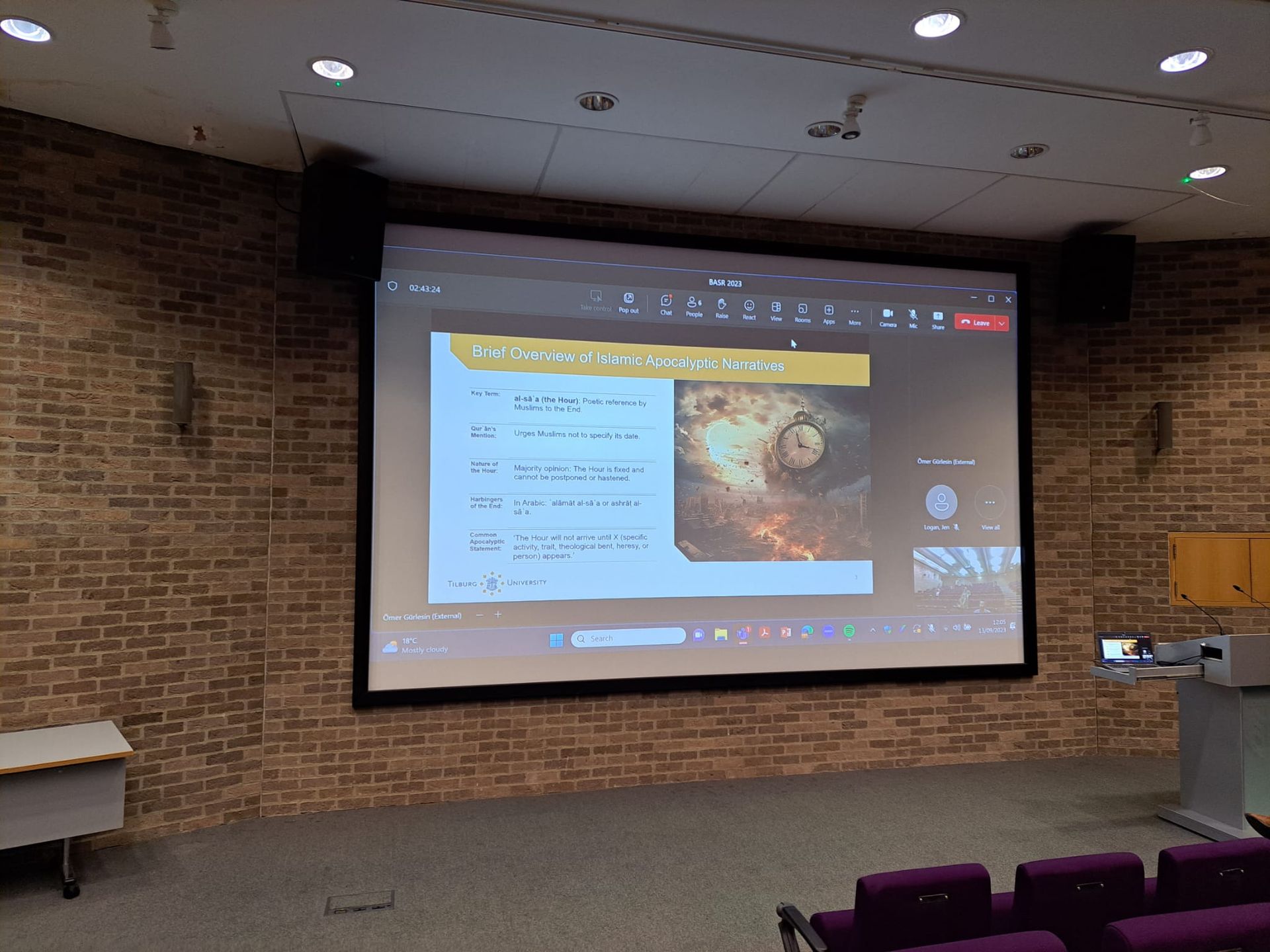Ömer F. Gürlesin and Deborah de Koning represented the NWO research group ‘Religion and Climate Change’ at the BASR Annual Conference
From 11th September 2023 until 13th September 2023 the BASR (British Association for the Study of Religions) Annual Conference 2023 was held in collaboration with CenSAMM (Centre for the Critical Study of Apocalyptic and Millenarian Movements) at Clare’s College in Cambridge. The theme of the conference was “Environmental Endings and Religious Futures”. The two post-doctoral researchers of the NWO project ‘Religion and Climate Change’ – Ömer F. Gürlesin and Deborah de Koning – attended the conference.
Deborah the Koning delivered an in-person paper in the first session of the conference. In this session on Ecotherapy, Eco-rituals, and Nature Spirituality she presented how the particular research angle of climate-rituals – which she defines as the meaning-making practices of people in response to the climate crisis – offers fascinating insights into the re-emergence of religion and new forms of the post-secular sacred in the climate crisis. She provided two examples of climate rituals: the (Christian) Ash Wednesday Celebration and (Buddhist) Walking Meditation.
The example of the Ash Wednesday Celebration that she discussed, was held in Amsterdam on February 22, 2023 next to the railway track of a coal transportation train. In this particular Ash Wednesday Celebration, the meaning of the phrase that is used in traditional Ash Wednesday Celebrations (most frequently held in church buildings) ‘dust you are and to dust you shall return’ was extended. The ash cross not only commemorated the life, death, and resurrection of Jesus and a shared mortality but also pointed towards the destruction brought about by the fossil industry. The location of the ritual – the railway track of a coal transportation train – added to the sensorial experience of a shared transience with the earth.
The other example that she provided was the practice of walking meditation by people of the Buddhist Earthholder sangha. This community stands in the tradition of the Zen Buddhist monk Thich Nhat Hanh. Buddhism has a long tradition of walking meditation. One of the key features of walking meditation as it is practiced by climate concerned people from the Earthholder sanga in the Netherlands is that the ritual walking has to be conducted in ‘nature’ – preferably a forest – where people mindfully absorb the environment and exchange with every footstep love with the Earth. Walking meditation aims to reconnect with yourself and nature beyond the self (preferably trees, flowers, and the earth). The examples of these climate rituals in the Netherlands illustrate how ‘Nature’ and ‘Earth’ seem to emerge as new forms of the post-secular sacred in and how the embodied experiences of interconnectedness with those news forms of the post-secular sacred create alternative forms of belonging. In the same session Julia Itel provided another example of how people try to connect to nature through mindfully immersing themselves into forests (forest bathing). Some people practice forest bathing as an eco-therapeutical practice; nature then becomes a co-therapist. Others practice forest bathing in the context of eco-psychology; nature then becomes a co-patient.

Deborah de Koning presented an in-person paper at the BASR Conference 2023 on September 11, 2023 Cambridge
On the final day of the conference Ömer F. Gürlesin presented his paper ‘From Text to Action: Exploring the Role of Islamic Apocalyptic Narratives in Muslim Environmental Activism on Social Media’ in the session on Eschatological Narratives: Christian and Islamic.
Gürlesin highlighted the fundamental concepts of Islamic apocalyptic narratives. These include terms such as "al-sāʿa" (The Hour), "fitna" (a trial or test on earth), and "malḥama" (a great battle or massacre). He also discussed the roles of the main actors of the apocalypse in Islam: al-Mahdī, ʿĪsā (Jesus), al-Dajjāl (Antichrist), and al-Sufyānī. In the methodology section of the presentation, Gürlesin explained how the digital content of four Muslim environmental groups, namely The Islamic Foundation for Ecology and Environmental Sciences (IFEES), Green Muslims, The Eco Muslims, and Khaleafa, was analyzed. This analysis utilized specific key terms derived from Islamic eschatology to determine the frequency and context of these terms in the digital narratives of these groups.
Gürlesin's findings indicated that these Muslim environmental groups did not notably incorporate the key Islamic apocalyptic terms into their narratives. This suggests that these organizations might be choosing to avoid eschatological and apocalyptic discourse in their environmental activism. Lastly, Gürlesin discussed the dominant narrative presented by these groups on their digital platforms, emphasizing a hopeful discourse. He also deliberated on possible reasons for their avoidance of apocalyptic narratives. These reasons might include their status as a minority group in the West, the potential societal anxiety that apocalyptic narratives could create, and the possibility of such narratives evoking feelings of despair.
In response to questions about the presence of apocalyptic narratives on social media and the potential impact of secularization in the West on these discourses, Gürlesin clarified: The findings of his study were limited to the narratives presented on the official pages and social media accounts of the four environmental organizations. However, when social media is examined more broadly, considering forums and user reactions, it's possible to encounter the presence of apocalyptic narratives. Regarding secularization, institutions might adopt different positions. For instance, in his previous research, he noted distinct differences in the Friday sermons delivered by the religious authority in Turkey, where there has been a notable rise in Islamization, compared to its international extension in the Netherlands, a secularized state with a secularized society. In Turkey, climate disasters were openly blamed on LGBTQ groups in these sermons. In contrast, this narrative was entirely abandoned in the Netherlands. He emphasized that this shift might not be due to theological reasons but rather practical considerations.

Ömer F. Gürlesin presented his online paper at the BASR Conference 2023 on September 13 2023

